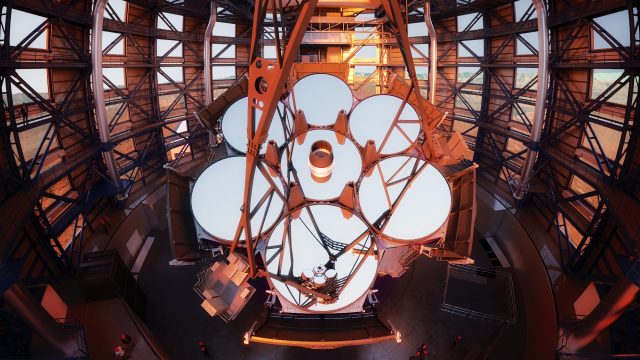The “blind spot” in science that’s fueling a crisis of meaning

- Science is the most powerful and successful form of objective knowledge gathering.
- However, we lack a comparable understanding of how our lived experiences are essential to all human knowledge.
- In the 2024 book The Blind Spot, Adam Frank, Marcelo Gleiser, and Evan Thompson argue that this conceptual disconnect between the observer and the observed is fueling a crisis of meaning.
Our scientific worldview has gotten stuck in an impossible contradiction, making our present crisis fundamentally a crisis of meaning. On the one hand, science appears to make human life seem ultimately insignificant. The grand narratives of cosmology and evolution present us as a tiny contingent accident in a vast indifferent Universe. On the other hand, science repeatedly shows us that our human situation is inescapable when we search for objective truth because we cannot step outside our human form and attain a God’s-eye view of reality.
Cosmology tells us that we can know the Universe and its origin only from our inside position, not from the outside. We live within a causal bubble of information — the distance light traveled since the Big Bang — and we cannot know what lies outside. Quantum physics suggests that the nature of subatomic matter cannot be separated from our methods of questioning and investigating it. In biology, the origin and nature of life and sentience remain a mystery despite marvelous advances in genetics, molecular evolution, and developmental biology. Ultimately, we cannot forgo relying on our own experience of being alive when we seek to comprehend the phenomenon of life. Cognitive neuroscience drives the point home by indicating that we cannot fully fathom consciousness without experiencing it from within.
Each of these fields ultimately runs aground on its own paradoxes of inner versus outer, and observer versus observed, that collectively turn on the conundrum of how to understand awareness and subjectivity in a Universe that was supposed to be fully describable in objective scientific terms without reference to the mind. The striking paradox is that science tells us both that we’re peripheral in the cosmic scheme of things and that we’re central to the reality we uncover. Unless we understand how this paradox arises and what it means, we’ll never be able to understand science as a human activity, and we’ll keep defaulting to a view of nature as something to gain mastery over.
Each of the cases just mentioned — cosmology and the origin of the Universe, quantum physics and the nature of matter, biology and the nature of life, cognitive neuroscience and the nature of consciousness — represents more than an individual scientific field. Collectively they represent our culture’s grand scientific narratives about the origin and structure of the Universe and the nature of life and the mind. They underpin the ongoing project of a global scientific civilization. They constitute a modern form of mythos: They are the stories that orient us and structure our understanding of the world.
For these reasons, the paradoxes these fields face are more than mere intellectual or theoretical puzzles. They signal the larger unreconciled perspectives of the knower and the known, mind and nature, subjectivity and objectivity, whose fracture menaces our project of civilization altogether. Our present-day technologies, which drive us ever closer to existential threats, concretize this split by treating everything — including, paradoxically, awareness and knowing themselves — as an objectifiable, informational quantity or resource. It’s precisely this split — the divorce between knower and known and the suppression of the knower in favor of the known — that constitutes our meaning crisis. The climate emergency, which arises from our treating nature as just a resource for our use, is the most pronounced and catastrophic manifestation of our crisis.
In short, although we have created the most powerful and successful form of objective knowledge of all time, we lack a comparable understanding of ourselves as knowers. We have the best maps we’ve ever made, but we’ve forgotten to take account of the map makers. Unless we change how we navigate, we’re bound to head deeper into peril and confusion.
[A]lthough we have created the most powerful and successful form of objective knowledge of all time, we lack a comparable understanding of ourselves as knowers.
Adam Frank, Marcelo Gleiser, & Evan Thompson
We call the source of the meaning crisis the Blind Spot. At the heart of science lies something we do not see that makes science possible, just as the blind spot lies at the heart of our visual field and makes seeing possible. In the visual blind spot sits the optic nerve; in the scientific blind spot sits direct experience — that by which anything appears, shows up, or becomes available to us. It is a precondition of observation, investigation, exploration, measurement, and justification. Things appear and become available thanks to our bodies and their feeling and perceiving capacities. Direct experience is bodily experience.
“The body is the vehicle of being in the world,” says French philosopher Maurice Merleau-Ponty, but first-hand bodily experience lies hidden in the Blind Spot.
The tragedy the Blind Spot forces on us is the loss of what’s essential to human knowledge — our lived experience. The Universe and the scientist who seeks to know it become lifeless abstractions. Triumphalist science is actually humanless, even if it springs from our human experience of the world. This disconnection between science and experience, the essence of the Blind Spot, lies at the heart of the many challenges and dead ends science currently faces in thinking about matter, time, life, and the mind.
Scientific knowledge isn’t a window onto a disembodied, God’s-eye perspective. It doesn’t grant us access to a perfectly knowable, timeless objective reality, a “view from nowhere,” in philosopher Thomas Nagel’s well-known phrase. Instead, all science is always our science, profoundly and irreducibly human, an expression of how we experience and interact with the world. But our science is also always the world’s science, an expression of how the world interacts with us. Science strives to be a self-correcting narrative. A successful scientific narrative is made from the world and our experience of it evolving together.





